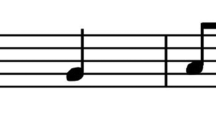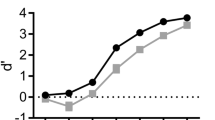Abstract
IF more items are presented than are to be recalled, the additional items produce a large amount of ‘stimulus interference’ in the recall of the remaining items1. This is true under conditions where subjects have complete knowledge of the items that are not to be recalled, this knowledge being possessed by the subjects before, during, and after presentation of the list. Even though subjects know which items to ignore, they cannot ignore them completely, and therefore the extra presented items interfere with the memory trace for the items to be recalled.
Similar content being viewed by others
References
Selzer, L. K., and Wickelgren, W. A., Nature, 200, 1239 (1963).
Fletcher, H., Speech and Hearing in Communication (Van Nostrand: Princeton, 1953).
Author information
Authors and Affiliations
Rights and permissions
About this article
Cite this article
WICKELGREN, W. Effects of Different Terminal Sounds on Short-term Memory for Initial Consonant Sounds. Nature 203, 1199–1200 (1964). https://doi.org/10.1038/2031199a0
Issue Date:
DOI: https://doi.org/10.1038/2031199a0
- Springer Nature Limited





